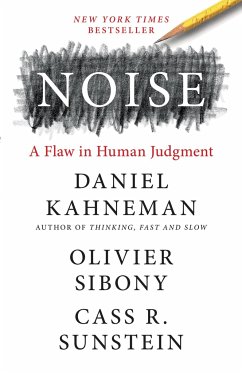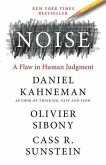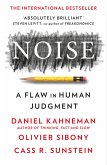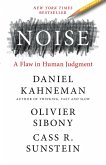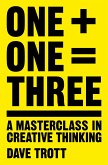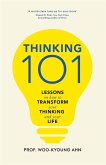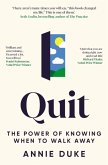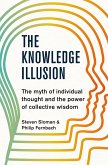NEW YORK TIMES BESTSELLER From the Nobel Prize-winning author of Thinking, Fast and Slow and the coauthor of Nudge, a revolutionary exploration of why people make bad judgments and how to make better ones—"a tour de force” (New York Times). Imagine that two doctors in the same city give different diagnoses to identical patients—or that two judges in the same courthouse give markedly different sentences to people who have committed the same crime. Suppose that different interviewers at the same firm make different decisions about indistinguishable job applicants—or that when a company is handling customer complaints, the resolution depends on who happens to answer the phone. Now imagine that the same doctor, the same judge, the same interviewer, or the same customer service agent makes different decisions depending on whether it is morning or afternoon, or Monday rather than Wednesday. These are examples of noise: variability in judgments that should be identical. In Noise, Daniel Kahneman, Olivier Sibony, and Cass R. Sunstein show the detrimental effects of noise in many fields, including medicine, law, economic forecasting, forensic science, bail, child protection, strategy, performance reviews, and personnel selection. Wherever there is judgment, there is noise. Yet, most of the time, individuals and organizations alike are unaware of it. They neglect noise. With a few simple remedies, people can reduce both noise and bias, and so make far better decisions. Packed with original ideas, and offering the same kinds of research-based insights that made Thinking, Fast and Slow and Nudge groundbreaking New York Times bestsellers, Noise explains how and why humans are so susceptible to noise in judgment—and what we can do about it.

Wie "Noise" unsere Entscheidungen verzerrt
Daniel Kahneman, Olivier Sibony und Cass Sunstein verlieren keine überflüssigen Worte. Statt einer langatmigen Einleitung steht am Anfang ihres neuen Buchs "Noise" der Satz: "Stellen Sie sich vor, vier Gruppen von Freunden gehen zu einem Schießstand." Gleich ist der Leser drin in einem Gedankenexperiment, welches das Problem anfassbar macht, das die zwei Großen der Verhaltensökonomik mit ihrem Partner Sibony thematisieren: Zufällige Einflüsse, die mit der eigentlichen Entscheidung überhaupt nichts zu tun haben, verzerren die Einschätzungen jedes Menschen in erschreckendem Umfang. Die unsystematischen Einwirkungen erzeugen ein Grundrauschen, "Noise" lautet der englischsprachige Fachbegriff.
Das Buch, das in der vergangenen Woche international gleichzeitig erschien, rückt diesen Entscheidungsbeeinflusser, der in vielen Studien schlicht als gegeben hingenommen und nicht weiter thematisiert wird, ins Rampenlicht. Da gehört er auch hin, wie die drei anhand eindrücklicher Beispiele klarmachen: Wussten Sie zum Beispiel, dass Richter, wenn sie hungrig sind, strenger urteilen? Die Autoren zitieren mehrere amerikanische Studien, denen zufolge Richter in Verhandlungen direkt nach dem Frühstück oder Mittagessen deutlich eher dazu neigten, Strafen zur Bewährung auszusetzen, als vor dem Essen. Im Fall eines Einbruchs, dessen identische Akte 47 Richtern vorgelegt wurde, hielt einer von ihnen eine Haftstrafe von 30 Tagen nebst einer geringen Geldstrafe für angemessen, ein anderer verhängt fünf Jahre Gefängnis. Auch andere völlig unverwandte Faktoren wie die Außentemperatur oder ob der örtliche Sportverein gerade gewonnen hat, beeinflussten Strafurteile signifikant.
Auch und insbesondere ist die Erforschung von Rauschen in der Abgrenzung von Voreingenommenheit (Bias) notwendig. Denn jene verzerrt Entscheidungen systematisch - Bewerber mit dunkler Hautfarbe oder einem fremdländisch klingenden Namen werden bei gleicher Qualifikation weniger oft eingestellt als weiße Menschen mit einem deutschen Namen. Da die Abweichungen von einer optimalen Entscheidung dort aber immer in die gleiche Richtung gehen, ist Voreingenommenheit einfacher zu greifen und auch schon viel besser erforscht. "Bias ist sozusagen der Star der Show, während Noise im Allgemeinen hinter den Kulissen verborgen bleibt", schreiben Kahneman, Sibony und Sunstein. Beispiele für systematische Verzerrungen im Strafrecht sind etwa, dass Richterinnen ihre Ermessensspielräume häufiger zur Milderung von Urteilen einsetzen als Richter. Ebenso tun das dem Buch zufolge amerikanische Richter jeden Geschlechts, die von einem Präsidenten der demokratischen Partei ernannt wurden.
Die drei Forscher der Spitzenuniversitäten Princeton (Kahneman), Harvard (Sunstein) und HEC Paris (Sibony) vertreten einen praxisorientierten Ansatz in der Diskussion des Phänomens. Gemäß dem Untertitel des Buches "Was unsere Entscheidungen verzerrt - und wie wir sie verbessern können" wollen sie auch Lesern ohne fachlichen Hintergrund möglichst konkrete Methoden an die Hand geben. Deshalb entwickeln sie zunächst eine Methode, Rauschen zu messen. Sogenannte "Noise Audits" sollen ergründen, wie stark Entscheidungen durch Zufallsstreuung beeinflusst werden. Hinter dem hochtrabend klingenden Namen verbirgt sich allerdings hauptsächlich die Messung, wie weit verschiedene Schätzungen eines Werts voneinander abweichen - zum Beispiel wie unterschiedlich mehrere Marktforscher den Marktanteil eines Unternehmens im Folgejahr einschätzen. Das erfolgt mit einer simplen statistischen Methode. Die eigentlich bemerkenswerte Erkenntnis des Buches folgt erst darauf: Denn Kahneman, Sibony und Sunstein stellen fest, dass Noise und Bias unabhängig voneinander Entscheidungen verzerren und deshalb auch unabhängig voneinander bekämpft werden können. Das Argument, der Zufallsfehler sei zu vernachlässigen, weil der Hauptteil eines Fehlers doch sowieso auf Voreingenommenheit zurückgehe - was in der öffentlichen Diskussion um Gerichtsurteile, Asylentscheidungen oder Vorstellungsgespräche gerne angebracht wird -, trifft also nicht zu. Stattdessen macht es eine Entscheidung immer besser, wenn man es schafft, das sie beeinflussende Rauschen zu reduzieren, ganz egal wie hoch die zugrunde liegende Voreingenommenheit auch sein mag.
Auf Basis dieser Erkenntnis deduzieren die drei eine Reihe von Regeln, die gerade Gruppenentscheidungen - zum Beispiel in Vorstandssitzungen - verbessern können, auch wenn sie der Intuition zunächst widersprechen. Auch bei der Entwicklung dieser "Entscheidungshygiene" gibt sich das Buch sehr praxisorientiert. Einige der empfohlenen Verhaltensweisen kennt man schon aus den Bestsellern "Thinking, Fast and Slow" von Kahneman und "Nudge" von Sunstein und Richard Thaler, dennoch ist ihre Anwendung auf Noise gewinnbringend. Die Analyse der unsystematischen Fehler lässt kaum einen anderen Schluss zu, als dass jeder, der für sich in Anspruch nehmen will, durchdachte Entscheidungen zu treffen, diese Methoden beherzigen sollte. Daniel Kahneman hat den Nobel-Gedächtnispreis für Wirtschaftswissenschaften 2002 zu einem guten Teil dafür erhalten, dass er offenlegte, wie fragil die Annahme vollständiger Rationalität in der gängigen Entscheidungstheorie und Volkswirtschaftslehre ist. Dieses Programm führt er - wie nicht anders zu erwarten - mit "Noise" konsequent weiter. Und auch dieses Mal sollte man den 87-Jährigen und seine Mitstreiter lesen, wenn man an Entscheidungen in der wirklichen Welt, jenseits des Lehrbuchs, interessiert ist.
BASTIAN BENRATH
Daniel Kahneman, Olivier Sibony, Cass R. Sunstein: Noise. Was unsere Entscheidungen verzerrt - und wie wir sie verbessern können, Siedler Verlag, München 2021, 480 Seiten, 30 Euro.
Alle Rechte vorbehalten. © F.A.Z. GmbH, Frankfurt am Main
The Sunday Times bestseller (May 2021)
'A tour de force of scholarship and clear writing'
New York Times
'This is a monumental, gripping book. It is also bracing ... The three authors have transformed the way we think about the world. They have looked beneath and beyond the way we make decisions and organise our lives. A follow-up of sorts to Thinking, Fast and Slow, it is a further step down the road towards a more complex and realistic grasp of human affairs that is replacing the crude simplifications of the recent past. Outstanding'
Sunday Times
'As you'd expect from its authors, it is a rigorous approach to an important topic... There's lots to surprise and entertain. Anyone who has found the literature on cognitive biases important will find this a valuable addition to their knowledge' Danny Finkelstein, The Times
'Noise is everywhere and is seriously disruptive. The authors have come up with a bold solution. The book is a satisfying journey through a big but not unsolvable problem, with plenty of fascinating case studies along the way. Humans are often bad at making decisions. But we can get better'
Martha Gill, Evening Standard
'The greatest source of ineffective policies are often not biases, corruption or ill-will, but three "I": Intuition, Ignorance and Inertia. This book masterfully demonstrates why the three "I" are so pervasive, and what we can do to fight them. An essential, eye opening read'
Esther Duflo, winner of a 2019 Nobel Prize
'In Noise, the authors brilliantly apply their unique and novel insights into the flaws in human judgment to every sphere of human endeavour... Noise is a masterful achievement and a landmark in the field of psychology'
Philip E. Tetlock, co-author of Superforecasting
'An electrifying exploration of the human mind, this book will permanently change the way we think about the scale and scope of bias'
David Lammy
'A tour de force of scholarship and clear writing'
New York Times
'This is a monumental, gripping book. It is also bracing ... The three authors have transformed the way we think about the world. They have looked beneath and beyond the way we make decisions and organise our lives. A follow-up of sorts to Thinking, Fast and Slow, it is a further step down the road towards a more complex and realistic grasp of human affairs that is replacing the crude simplifications of the recent past. Outstanding'
Sunday Times
'As you'd expect from its authors, it is a rigorous approach to an important topic... There's lots to surprise and entertain. Anyone who has found the literature on cognitive biases important will find this a valuable addition to their knowledge' Danny Finkelstein, The Times
'Noise is everywhere and is seriously disruptive. The authors have come up with a bold solution. The book is a satisfying journey through a big but not unsolvable problem, with plenty of fascinating case studies along the way. Humans are often bad at making decisions. But we can get better'
Martha Gill, Evening Standard
'The greatest source of ineffective policies are often not biases, corruption or ill-will, but three "I": Intuition, Ignorance and Inertia. This book masterfully demonstrates why the three "I" are so pervasive, and what we can do to fight them. An essential, eye opening read'
Esther Duflo, winner of a 2019 Nobel Prize
'In Noise, the authors brilliantly apply their unique and novel insights into the flaws in human judgment to every sphere of human endeavour... Noise is a masterful achievement and a landmark in the field of psychology'
Philip E. Tetlock, co-author of Superforecasting
'An electrifying exploration of the human mind, this book will permanently change the way we think about the scale and scope of bias'
David Lammy

